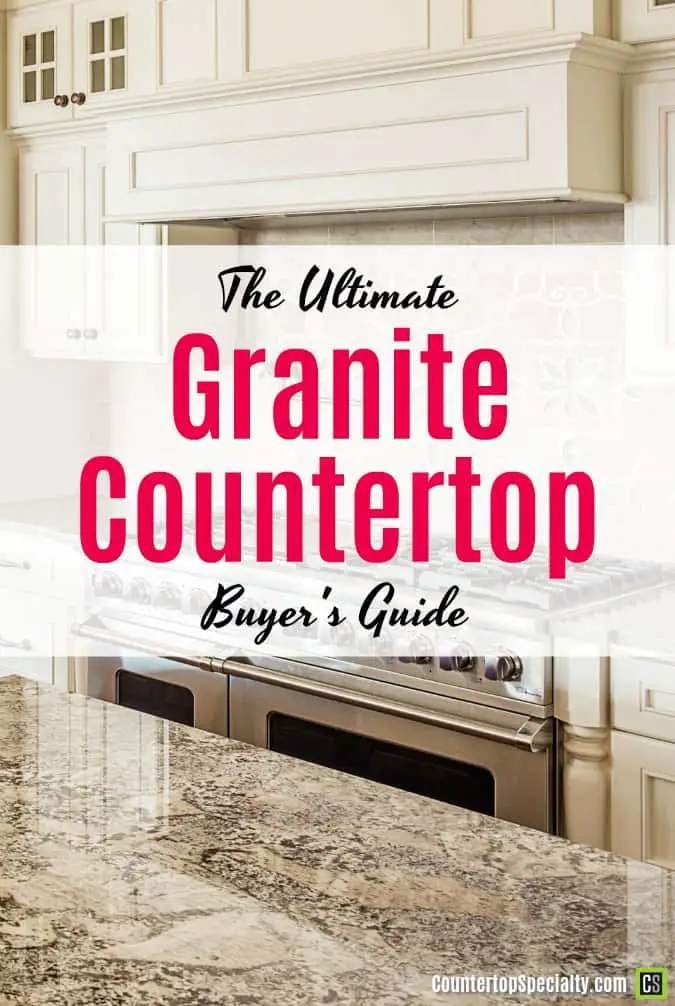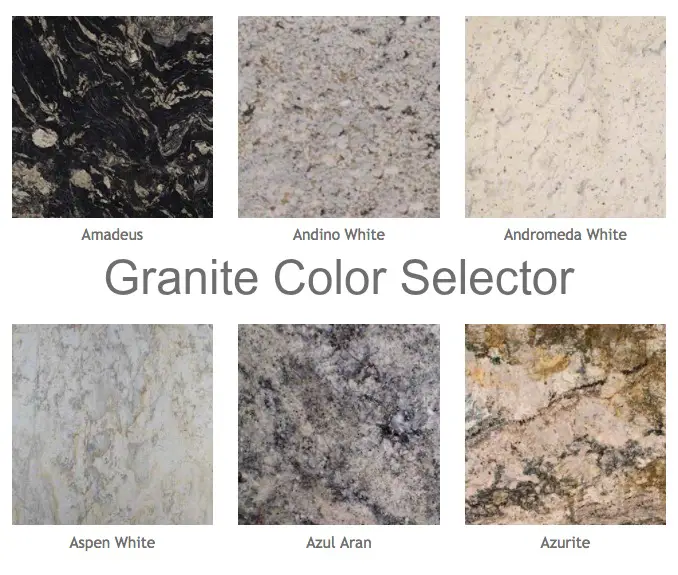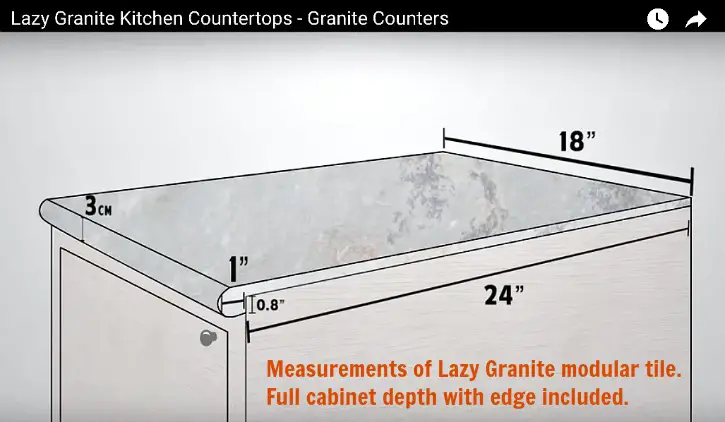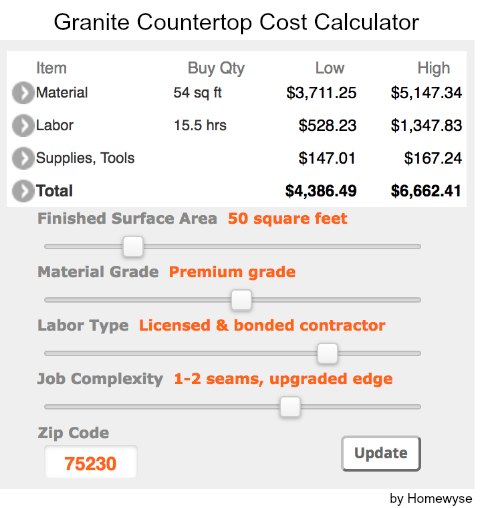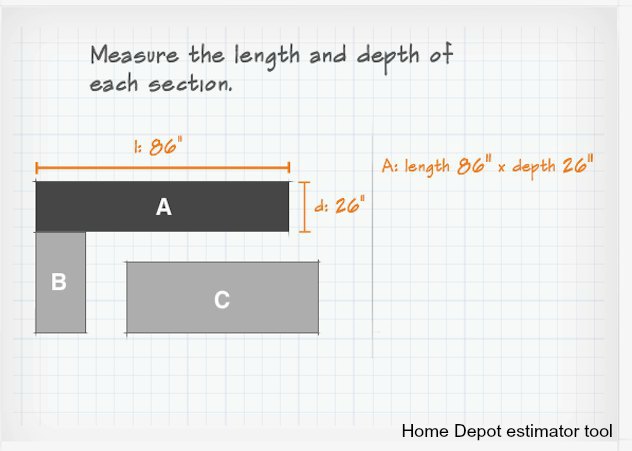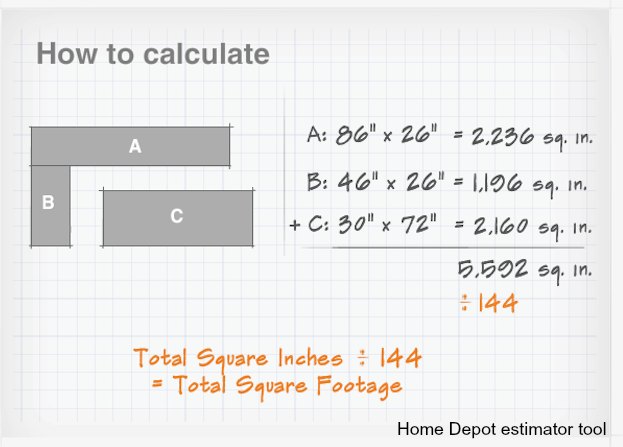The Ultimate Granite Countertops
Review & Buyer's Guide
Whether you're building a new home or considering a home renovation project, you should consider using granite countertops for kitchen and bath. Popular for several decades, granite has proven to be a durable countertop material that's available in a surprising range of colors. In this in-depth guide, we'll cover the pros and cons of granite and provide useful tips on granite countertop selection, installation and maintenance.
On This Page
- Why Granite Countertops Are Still So Popular
- Sealing & Cleaning Granite
- Granite Countertop Colors & Patterns
- Granite Color Selector Tool
- Granite Countertop Finishes
- Types of Granite Countertops
- Granite Slabs
- Granite Tile Countertops
- Modular Granite Countertops
- Granite Overlays
- How To Buy Granite Countertops
- Cost of Granite Countertops
- How To Measure Granite Countertops
- How To Choose a Granite Fabricator
For centuries, granite has excelled as a building material prized for its durability. In today's homes you'll find granite on indoor and outdoor kitchen countertops, bathroom countertops, floor tile, patio paving, fireplaces, tub decks, shower surrounds and walls... inside and outside.
Granite was created millions of years ago when extreme heat and pressure forged quartz, mica, feldspar and other minerals into very dense structures. The result is one of the hardest and strongest materials in nature. Today we have over 2500 fascinating granite colors and patterns available.
Why Choose Granite Countertops? Pros and Cons
Despite the rise of newer countertop materials like quartz, neolith, porcelain and quartzite, granite is still popular for its durability. In fact, granite is consistently rated the top performing kitchen countertop material by leading consumer magazines when compared to quartz, marble, Corian, butcher block, ceramic tile, and stainless steel.
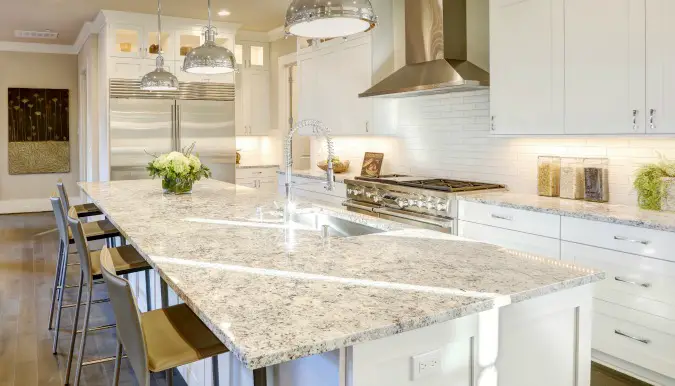
Granite Countertop Pros
- Available in thick or thin slabs, tiles, or modular installations
- Withstands heavy use better than all other surfaces
- Nearly impossible to scratch
- Easy to clean
- Heat proof - you can place hot pans directly on the surface
- More hygienic than other surfaces, except quartz
- Stains are easily prevented and removed
- Resists etching from acidic foods
- Unlike most countertop materials, granite can be repaired to like new condition
Granite Countertop Cons
- Every granite countertop slab is naturally unique, so choose carefully
- Sealer may be needed (but is easy to apply)
When compared to other surface materials, granite countertops provide the best performance and have few drawbacks.
Sealing & Cleaning Granite Countertops
For homeowners, the biggest concerns they'll have with granite countertops are possible staining and etching. Since granite is a natural product it varies in density. Granite is porous to a certain degree, making it susceptible to staining. However, many types of granite are so dense that sealing is not necessary. We recommend always testing the absorbency of your granite countertops to determine whether you should seal them.
The densest varieties of granite countertop are without question the very best countertop materials available. For example, dark colors like Uba Tuba granite, Blue Pearl granite, Absolute Black, Black Galaxy or Baltic Brown granite are so dense they simply will not stain; they do not need sealing... ever.
Light-colored stones (like Santa Cecilia granite) and white granite colors like Kashmir White are porous and more prone to staining. For homeowners who are hoping to install granite countertops in white, understand they may be difficult to seal effectively. For white countertops, quartz or Neolith countertop materials are an excellent option.
Protecting and sealing granite is typically not difficult; in most cases, homeowners can do their own sealant application with products available at retail.
Granite Countertop Sealing
Sealing your granite countertops is the best way to protect them from possible staining. Applying a sealer is no more difficult than painting a wall; it's an easy DIY project. A simple water test will demonstrate your stone's absorbency so you can determine whether or not to seal granite countertops.
We highly recommend using a Permanent Bond Granite Sealer or one of these impregnating sealers to protect porous types of granite.
Cleaning Granite Surfaces
Cleaning granite is easy; for quick clean-ups of spills and crumbs, use hot water and a sponge or clean cloth. For thorough cleaning & polishing, use a quality granite cleaner and then apply a topical stone polish.
Granite countertops may etch over the years if exposed to acidic cleaning products, especially if they are highly polished. However, it's easy to prevent etching by avoiding acids like lemon juice and vinegar. Place sponges or soap bottles on a tray to keep soap from sitting on the countertop.
For more tips on granite countertop maintenance, just follow our Do's & Don'ts Guide.
Granite Countertop Colors & Patterns
From a design perspective granite is a versatile countertop material. The most popular colors in 2025 include Colonial White, Alpine Valley, Azul Celeste, Sunset Cloud, Titanium and Nero Mist; these granite colors work with a wide range of design themes. However, granite's broad spectrum of colors (2500+) and interesting array of patterns offer endless possibilities... far more than any other countertop material.
The granite color spectrum includes black and white, golden brown, pale pink, taupe, soft green, black and gray, flecked white granite and subtle shades in-between.
The granite color spectrum includes black and white, golden brown, pale pink, taupe, soft green, black and gray, flecked white granite and subtle shades in-between.
Surface patterns display a characteristic course-grained, flecked, or pebbled appearance. In fact, the word "granite" originates from the Latin word granum meaning "grain". These grains vary in size, shape and density across the pattern depending on the particular mix of quartz, feldspar, mica and other crystals and minerals that make up the stone.
Granite patterns may be solid, speckled with a uniform appearance over the entire countertop, or marbled with a pattern that flows and changes without repetition. This flow is known as "movement".
Solid Granite Patterns
Completely solid colors are not common in granite because of its mineral composition. However, Absolute Black granite is one popular example.
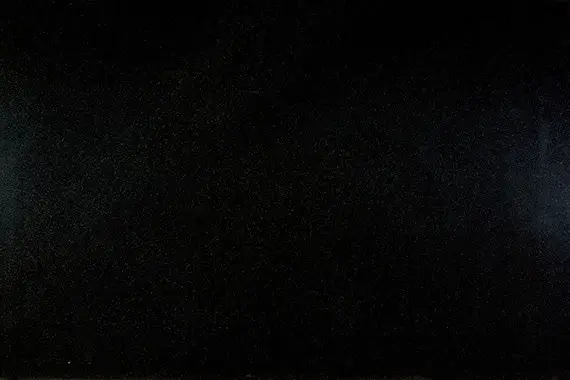 Absolute Black Granite
Absolute Black GraniteSpeckled Granite Patterns
Bianco Catalina white granite and Black Galaxy granite are prime examples of the uniform speckled pattern of many granite colors.
 Bianco Catalina Granite
Bianco Catalina Granite Black Galaxy granite
Black Galaxy graniteMarbled Granite Patterns
On the other end of the spectrum are marbled patterns with a lot of movement, such as Indian Juparana granite and Azul Aran gray granite.
 Indian Juparana granite
Indian Juparana granite Azul Aran granite
Azul Aran graniteGranite with movement is popular for the organic, dramatic look it adds to your kitchen or bathroom design. Styles of movement vary, from the river-like flow of Indian Juparana to the turbulent stormy-sea of Azul Aran, or the more spacious pattern of the Colonial White granite below.
 Colonial White granite
Colonial White graniteSome granite patterns feature both structure and movement. One example is the popular Santa Cecilia granite, which has a consistent pattern that contains a subtle flow.
 Santa Cecilia granite
Santa Cecilia graniteExotic Granite Patterns
Some granite patterns are so bold and random they are known as "exotic" granite counter top colors; these tend to be the most expensive.
 Exotic Copenhagen granite
Exotic Copenhagen graniteRemember, granite counter tops and other stones developed their color and pattern over millions of years, to create a surface that is truly unique. Finding a granite color and pattern that suits your interior design is not a problem, but choosing your favorite may be a challenge.
Granite Color Selector Tool
Need some help choosing your granite countertops? Search hundreds of popular granite colors using our "Granite Color Selector" tool.
Granite Countertop Finishes
In addition to the wide range of granite colors and patterns to choose from, homeowners must also decide on the texture or "finish" of their granite countertops. The most popular choices are polished or honed finishes; however, textured surfaces like leathered or flamed granite have unique appeal.
Polished Granite Finish
A mirror-like polished granite finish is a popular choice. Polishing granite counters enhances the color saturation for rich and vibrant colors, reveals subtle details in the pattern, and creates visual depth. Polished granite is very smooth to the touch, easy to clean, and looks fantastic.
 Polished Granite Finish
Polished Granite FinishThe granite polishing process also closes the pores of the granite, decreasing its absorbency and increasing stain-resistance. While sealer may still be needed (particularly on light or white granite countertops), polished granite offers superior stain-resistance to all other surface finishes. The main drawback of a polished finish is its tendency to show water spots.
NOTE: That glossy shine is achieved by using industrial machines with intense abrasion to smooth the slab surface until it shines. It cannot be created by applying a product or "polish".
A polished finish will last many years, and the shine can be enhanced by a topical granite polish, but these polishing products will not repair a dull finish. If polished granite does become dull, professional re-polishing is required to restore the glossy shine.
Honed Granite Finish
A honed finish is silky smooth, but not shiny. Described as a "matte" or "satin" finish, it has a softer, more vintage vibe. Colors and pattern details are more muted compared to a polished surface.
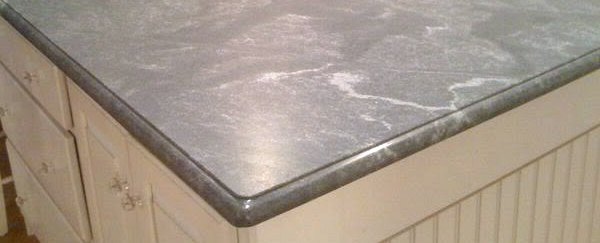 Honed Granite Finish
Honed Granite FinishIf more saturated color is desired, homeowners can apply a color-enhancing sealer to darken the color and add subtle sheen.
A honed finish is perfect for traditional kitchen design styles as well as rustic, farmhouse, and cottage interiors, but this versatile surface finish can work well in a modern kitchen too.
While a honed finish is warmer than a polished finish, it is slightly less stain-resistant. Dark colors (especially honed black granite) may show fingerprints. However, it is still easy to clean and maintain, and less likely to show water spots.
Textured and Leathered Granite Finishes
Textured granite surfaces are created using various techniques. Depending on the supplier, they may be called leathered, antiqued, brushed, hammered, or flamed. These rough granite countertop finishes have pronounced texture which creates a rustic look (while making fingerprints and water spots less visible).
Textured finishes can be beautiful on any granite color, but they are often used to add visual interest to solid black or gray granite.
 Leathered Granite Finish
Leathered Granite FinishA leathered finish is the most popular of the textured finishes. Like a polished finish, it has well-saturated colors and is more stain-resistant than honed surfaces.
Flamed finishes are created using an intense flame or blow torch to force minerals in the granite to explode, resulting in a dramatic, highly-textured surface that is very rough. This finish is primarily used for traction on outdoor flooring, or as a decorative finish on fireplaces, fountains, and walls.
The degree of texture on granite will vary depending on the composition of your particular granite color and pattern. Some leathered granite counters have a very light texture, while others feel more weathered and worn. The added texture may require a bit more effort when cleaning. With the exception of a flamed finish, textured surfaces are still practical for kitchen countertops.
Types of Granite Countertops
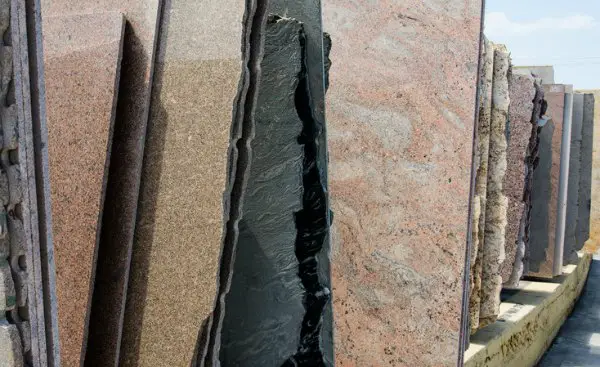
Granite Slab Countertops
Granite slabs are cut from huge blocks of granite and typically come in thicknesses of 2cm (3/4 inch) or 3cm (1 1/4 inch). The countertop shape is then cut out of the granite slabs just prior to installation. Most kitchen countertops will require 2 or more slabs, especially if the kitchen layout includes an island.
The 2cm thickness is less expensive, but the 3cm is more popular for its thicker edge profile. Using a thicker slab provides more design options when choosing your edge style.
A thick countertop edge profile can be achieved with a 2cm slab by laminating thicker material along the edge; this creates a seam that runs the length of the countertop edge. In most cases the seam can be well-hidden, but this depends on the specific edge profile and the color and pattern of the granite counter top.
Granite slab size (length x width) will vary depending on the size of the quarried blocks. Here are some useful measurements and tips to use when shopping for granite countertops:
Granite Countertop Slab Sizes & Shopping Tips
- Granite slab sizes range from 105" x 55" up to 130" x 80".
- The average slab size is around 114" x 66" (9 ft. 6" x 5 ft. 6").
- Large granite slabs are rare and typically more expensive.
- In most installations 20% - 30% of the slab is cut away and ends up as waste, unless you use it elsewhere, such as a bathroom vanity.
- Multiple slabs are usually required for the average kitchen.
- The number of seams is determined by your granite countertop layout, slab sizes, and number of slabs required.
- Always ask your granite fabricator for a seaming plan that shows the layout and seam placement before cutting.
- Kitchen islands under ten feet long usually require only one slab. For larger islands, it may not be possible to install granite without a seam.
See our How To Buy Granite section below for more detailed advice.
Granite Tile Countertops
Granite Tiles are an excellent choice for flooring in a kitchen or entry area, or for outdoor locations. A granite tile countertop can provide significant savings over a granite slab (up to 60%). Granite tiles offer the look of a granite countertop; however, there will be grout lines. Grout lines require additional maintenance because they need to be sealed and kept clean.
However, granite tile installation can be a DIY project for a skilled homeowner, while slab countertops must be professionally installed. When carefully installed with thin grout lines and large tile, a granite tile countertop is a great budget-friendly solution. It provides the most bang for the buck and is comparable to a laminate countertop.
Modular Granite Countertops
Modular granite countertops are a hybrid type of countertop that combines the lower cost and easier installation of tile with the look of a granite slab. Essentially, a modular granite countertop is made up of mini-slabs, which are like extra-large granite tiles.
These modular granite sections are prefabricated to match sections of standard countertop (center piece, sink cutout, corners, end). They are designed to fit a standard kitchen cabinet (24-inch depth) and often include edging. A modular granite tile system is less expensive than full granite slabs, but has fewer seams than a tile countertop.
The true cost savings of modular granite countertops comes from reduced installation and shipping costs. While it's not easy to install, homeowners can either DIY the installation or hire a tile installer. Without the savings on labor the total cost of modular granite countertops can be similar to slab granite.
Color choices in modular granite are very limited compared to granite tile or slabs. However, homeowners will find that 10 - 15 popular granite colors are available like gray, beige, black, blue, green and white granite. Only a handful of manufacturers offer prefabricated modular granite countertops or a granite overlay. The tile sizes, types of pieces, cost, available colors, and installation systems vary, so it's important to research the different options.
Pros of Modular Granite
- DIY installation possible
- Lower cost than granite slabs with DIY installation
- Looks similar to slab granite countertop with skilled installation
- Fewer seams than tile countertop
- Bullnose edge available
- Significantly lower shipping costs than granite slabs
Cons of Modular Granite
- Limited colors
- Countertops will have several seams
- Installation is a complex project
- Professional installation makes costs similar to slab granite
- Must order online without seeing granite in person
Granite Overlays
One other option is a granite countertop overlay offered by Granite Transformations. This is a franchise that installs ¼ inch slab granite countertops right over the top of your existing countertops. The advantages of granite overlay are its lower cost and faster installation. The ¼" thick slabs are cheaper than standard ¾ or 1 ¼ inch slabs; since the old countertops are kept as a base, the entire installation can be done in a day.
Color choices for granite overlay systems are limited, and typically the only available edge profile is a square edge. You’ll need to get a specific quote to determine how much savings a granite overlay provides over a traditional granite slab. However, granite overlays are definitely worth considering, especially for a rental property upgrade or when a project has a short time frame.
Modular Granite vs. Granite Overlays: Which Is Best?
Modular or prefabricated granite is very budget-friendly and granite overlay is ideal for some home improvement projects. However, when compared to full granite slabs the savings may not be significant enough to make these types of counter tops a good value.
Ideally, homeowners should choose full granite slab countertops when installing new granite counters in a home they intend to live in for many years. In addition to offering thousands of color choices, granite slabs are more durable and offer the highest resale value.
How To Buy Granite Countertops
Buying granite tile or a modular granite tile system is less complicated than shopping for granite slabs. The color choices are limited to popular granite colors that have a large available supply. Granite tiles are inspected, boxed, and sold according to color and pattern consistency. For example, if you are buying New Venetian Gold granite tiles you can expect the tiles to be fairly uniform in color or pattern.
The same is true when ordering a prefabricated modular tile system, which typically arrives with a consistent color and pattern. The primary concern is to ensure that none of the tiles have arrived broken.
Buying granite slabs however requires more research, planning and focus on the details.
Shop for Granite Slabs In Person
When shopping for granite, it's important to select your slabs in person. Shopping online and looking at samples in a showroom is a great way to narrow down the color you'd like to have. However, granite names are not exact, and there are over 2500 granite counter top colors with a lot of variation within each color.
For example, a Gray Pearl slab at one warehouse can look very different from one at another supplier, or from a photo you saw online. Or you may find granite slabs called Alaska White, Bianco Antico or Gris Conquistador that all look similar.
While it's helpful to begin with a short list of granite colors you like, the best way to buy granite countertops is to go to a stone warehouse and choose granite slabs in person.
It's also important to purchase all granite slabs for one project from the same bundle. Slabs are shipped from the quarry to the stone warehouse in specific bundles containing slabs that are cut sequentially from the same parent block.
Example: You need 3 granite slabs for your project. The granite color you like has 7 slabs in the bundle. These should all be numbered in the order they were cut from the block. To ensure a consistent pattern, choose slabs number 1, 2 and 3.... or numbers 3, 4 and 5. Since all slabs in a bundle have the same color and similar pattern structure, it's possible to choose the 3 slabs you like best regardless of order.
However, choosing slabs from different bundles is risky. Even if they look the same in the warehouse, a visible color difference between bundles may appear once the countertops are installed.
Inspect Each Granite Slab Carefully
Before committing to a granite slab, inspect the entire slab for excessive pits, fissures (weak points), and color or pattern anomalies you don't like. Discuss pattern placement with your fabricator, as they can often work around less attractive sections of stone.
Buyers can also perform the lemon juice test to check for durability and stone density. Granite countertops do not readily etch and the vast majority of granite slabs will pass the test. However, granite is a natural material and etching can be a problem with granite slabs that have been doctored to hide imperfections.
Choosing a Granite Countertop Slab Step-by-Step
- Don't choose granite by color name alone, as too much variation exists
- Begin with showroom samples to narrow down favorite colors
- Make your final selection by choosing from actual slabs
- Make sure purchased slabs are labeled with your name and set aside for your project
- Inspect each slab you intend to buy for cracks, fissures or unsightly pattern areas
- Test the slab for acid resistance using lemon juice
- For large orders, buy multiple slabs from the same bundle to ensure consistency
- The fabricator must supply a seaming plan for approval
- Choose the countertop edge profile at time of purchase
- Confirm on delivery that you've received the granite slabs you selected
Cost of Granite Countertops
Depending on where you live, granite countertop prices can be as low as $45 per square foot installed for a few common granite colors. Mid-priced granite slabs range from $60-$90 per square foot, while exotic granite types can run $125 or more. Expect to pay the most for extra-large slabs, complex fabrication, or unusual installation requirements - as much as $200 per square foot.
The main factor influencing the total cost of granite countertop installation is the cost of the granite slabs. The opposite is true for some materials. For instance, when comparing granite to concrete countertops, most of the cost comes from installation.
Granite Countertop Fabrication Costs
Standard fabrication and installation costs for a kitchen countertop are fairly constant, regardless of the specific granite color chosen. A standard installation includes cutouts for one sink and one cooktop, and a basic edge profile. Options will be limited to commonly available colors and a 2 cm thick slab, with no complex shapes, and no extra transportation or installation costs (like carrying slabs up stairs).
With additional cutouts for a second sink, complex shapes or curves, 3 cm thickness, or an upgraded an edge style, fabrication costs can increase substantially.
Granite Countertop Material Costs
The prices of different granite colors vary widely, and have the most impact on a project's total cost per square foot. For example, a standard installation may have fabrication costs of $2000, but the total project cost could range from $3000 to $7000 or more, depending on the price of the specific granite selected.
How To Calculate the Price of Granite Countertops
- Granite material cost, depending on color
- Slab thickness - 2cm vs. 3cm
- Number of sink & cooktop cutouts (1 of each is standard)
- Number of faucet and soap dispenser holes
- Complex shapes, curves or corners
- Type of edge profile (basic, decorative or laminated)
- Backsplash design: a 5" granite backsplash vs. granite slab or tile up wall
- Tear out of old countertops
- Difficulty of transportation & delivery (long distance, up stairs)
To find out more about countertop pricing, use this countertop cost calculator to estimate granite countertop prices, using adjustable variables for your project.
How To Measure Granite Countertops
Before getting a quote for installing granite countertops from local granite fabricators you'll want to know the total area or "square footage" of your countertop.
Of course, in Canada, Europe, and many other countries you may use square meters. The idea here is to use the measurement commonly used by local fabricators.
Here's how:
- Break down countertop into square or rectangular sections
- If you have unique shapes like round or triangular - treat them like square sections (i.e. a square large enough to contain the circle or triangle)
- Include areas for sink and cooktop
- Measure length & depth of each section in inches
- Multiply the length X depth of each section to calculate the area in square inches (L X D = Area)
- Add together the sum of each section to achieve the total countertop area in square inches
- Divide this total by 144 to convert sq. in. into square feet
- Round up to the next whole number square foot
- Backsplash is calculated in the same way. Measure length x height of backsplash
- Add together the sum of all sections measured in inches and divide by 144 to calculate square footage
- You’ll also want to calculate the linear feet of the countertop edge. This number will be used to quote the cost of creating your desired edge profile
- Measure the length of all outside (not against a wall) finished edges in inches, divide by 12 and round up to the nearest whole number for linear feet
How To Choose a Granite Fabricator
Most homeowners don't know how to choose the best granite fabricator, or they go about finding one the wrong way. They look for the cheapest price and hope it works out.
In truth, this approach may work for certain types of home remodeling or maintenance projects that don't require highly skilled craftsmanship, for example: painting a room, installing new appliances, or cleaning carpets. But for projects that require more skill, knowledge, and experience (like installing granite countertops) homeowners should choose a fabricator with proven expertise and excellent references. Price is only one factor.
The internet provides many review websites, helping you to take simple, common-sense steps to ensure you are hiring a reputable, quality granite fabricator.
- Use online services to find vetted local fabricators
- Check online reviews
- Call several granite fabricators to gauge initial professionalism and responsiveness
- Choose at least two suppliers to visit your house, discuss the project, and provide a quote (note: use the same type stone and color for each bid)
- Ensure fabricator is bonded and get license number
- Get references (any reputable fabricator will have former customers willing to provide a reference)
- Granite countertop installation requires high-level skill, knowledge, and experience
- Quality craftsmanship and service are more important than price
Homeowners should look not only for top skills and good quality work, but also a reliable, considerate, responsible, and responsive contractor with good customer service. These traits have real value and are worth paying a premium for to avoid frustrating and costly kitchen remodeling mistakes.
It's a good idea to follow the same steps even if your interior designer, home remodeling contractor, or builder is using "his guy" who will typically be a subcontractor.
Be smart when choosing a granite fabricator. The best deal is the one that provides the most value, which is not necessarily the lowest price.
How About Those Granite Countertop Ads for $25 sq. ft.?
If you want your granite counters to look good, you'll just ignore those cut-rate advertisements. In order to charge so little, these suppliers use low-grade, thin slabs that often have unsightly blemishes. They may hire unskilled workers and cut every possible corner; mistakes are highly likely. The low price you are quoted is unlikely to be the final price you pay, since incidental costs that are normally included are often tacked on at the end.
The money you save by using the cheapest fabricator is not worth what you lose in quality, and it's likely that your supplier will not be responsive if you ask for problems to be fixed. You won't be happy with a flawed countertop, no matter how cheap it was. People install natural stone because they want their kitchen or bathroom countertop to look fantastic.
Versatile, resilient and naturally beautiful, granite is an excellent surface for any project you're planning. No other natural stone or engineered stone can match the numerous and unique characteristics of granite countertops.
Consider the elegance of a granite for: kitchen countertops, kitchen islands, outdoor kitchens, bathroom vanities and granite tile for tub decks, shower surrounds, interior and exterior flooring, wall cladding and a granite tile countertop or backsplash.
Answers To Granite Counter Top Questions
Learn even more! Click on the links below to read detailed answers to common (and unusual) marble cleaning questions.
Granite Countertop Dull Around Sink
QUESTION: I have a Emerald Pearl granite countertop in my kitchen that is 8 years old. It looks great with the exception of some dullness around the …
Sealing vs Polishing Granite
QUESTION: I am looking for the easiest maintenance method for polishing granite I have that edges the marble floor I service.
It also surrounds the …
Restore Chemical Damage Dull Granite Countertops
QUESTION: We moved into a new home with medium brown/tan granite countertops.
My wife said that they were so hard it is nearly impossible to damage …
Are Kashmir White Granite Countertops Good?
QUESTION: I'm thinking of putting in Kashmir White granite countertops.
But I have heard that it is more difficult to care for than other granites. …
Pitting in New Granite Countertop
QUESTION: I recently had a labrador antique granite countertop installed in my kitchen.
We chose the slab, and it looked beautiful and smooth in …
Granite Countertop Seam and Crack Issues
QUESTION: We recently had Black Galaxy granite counter tops installed. After installation, we noticed a 4-foot-long line through the counter. It goes …
Kosmus Granite Countertop
QUESTION: We are about to install Kosmus granite counter tops.
It seems to have a lot of mica in it and my installer has told me that it is a very …
Unlevel Countertops
QUESTION: My installer put in our granite counter tops and they are not level.
He blames the cabinets for not being level and said they are set in …
Granite has blotchy appearance
QUESTION: I hope somebody can give me some advice!
We just had a new granite kitchen countertop installed.
It is absolutely gorgeous with lots …
Care and upkeep of new granite vanity top
QUESTION: Just had this granite vanity top installed. Purchased at Home Depot. brand: Pegasus, color: Napoli.
Website claimed this fact: Granite …
Why Isn't My Granite Super High Gloss Shiny
QUESTION: We had a granite counter top installed two years ago. I have noticed a few pits in it and it does not appear like it has a thick coating of …
Metallicus Granite Mica Flecks Coming Off
QUESTION: I work for a granite countertop fabrication facility, and recently we installed a kitchen for a customer, using Metallicus for the Island. …
Caring for Metallicus Granite
QUESTION: My wife and I are very interested in a granite countertop slab named "Metallicus".
It is a dark granite with what I call rivers of silver …
Repair Granite Chipping Around Sink
QUESTION: I am renting a house. I have been told that the countertops are granite.
The color is dark/black, with shell-like iridescent marks in …
Honed Absolute Black Granite
Countetops For Kitchen
QUESTION: I've been told that honed absolute black granite countertops stain very easily by some and that this is not true by others.
I really …
Maintaining Antiqued or Leathered Absolute Black Granite
QUESTION: We recently had leathered absolute black granite installed. The installer applied a granite sealer.
I asked him about some streaks …
Cloudy Spots On Granite
QUESTION: I have brown/black/tan/silver fleck granite countertops in my kitchen. I have had white cloudy marks in spots that I have tried to polish …
Non-Slip Granite Tile Treatment
QUESTION: Can a granite tile be flamed to give it the non-slip look/effect?
ANSWER: If you are asking if a "flamed" finish on granite will make …
Matching Different Granite Slab Colors
QUESTION: I recently got 3 slabs of tropical brown prefabbed granite for kitchen countertops.
We didn't notice that one granite countertop slab …
Make Dull Granite Countertop Shiny
QUESTION: My granite counter top is dull and has always been dull.
I want my counter top to shine like my other friends counter in their kitchens. …
Granite vs Man-Made Stone
QUESTION: We are remodeling our kitchen countertops and getting answers all over the place about man-made stone, granite, and different countertop …
Granite Crack
QUESTION: I have an Uba Tuba granite kitchen island and I have just noticed a hairline crack of about 8 inches running from the outside edge in the …
Which Granite looks like White Carrara Marble?
It seems that no other natural stone provokes the "I must have it!" feeling like white Carrara marble. It's gorgeous.
But acidic foods and drinks …
Best Country Origin For Granite
QUESTION: I am going to install granite countertops in my new home, I have seen stones from India, Canada and Brazil.
Is any stone origin better …
Filling Granite Countertop Pits
QUESTION: I have used a penetrating sealer on my granite countertop, but what can I use as a surface sealer to fill in all the pits in the granite? …
